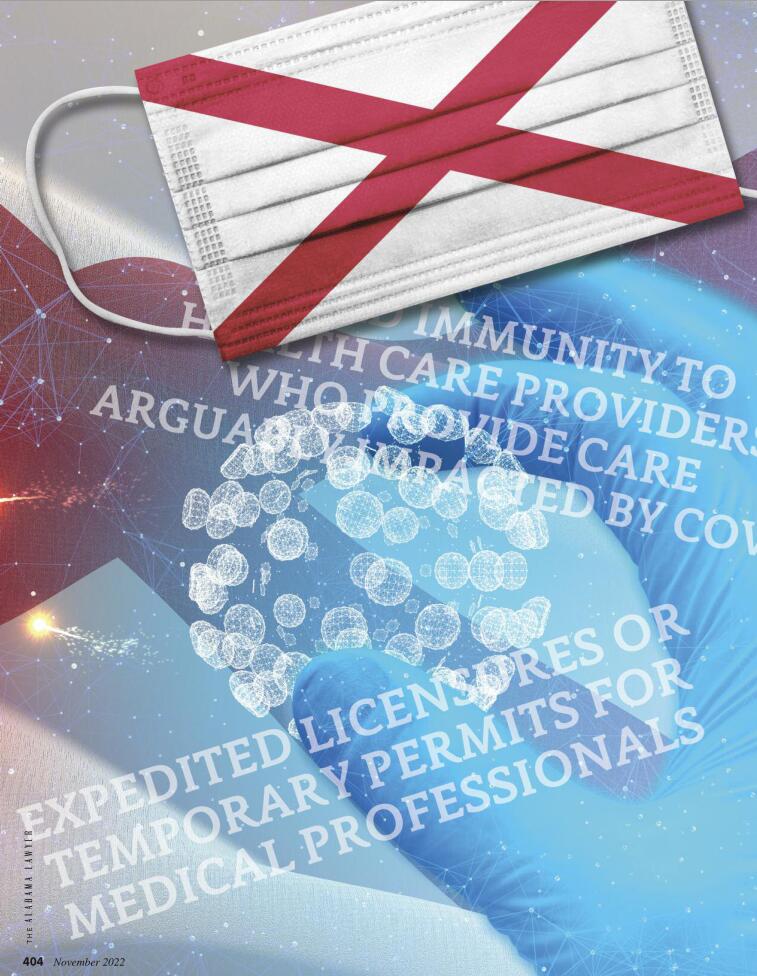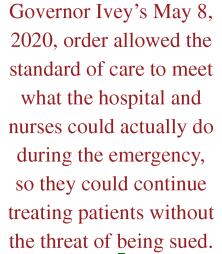Rebuttal: Alabama's Gubernatorial and Legislative Responses to the Covid-19 Pandemic Were Valid, Constitutional, and Appropriate
| Publication year | 2022 |
| Pages | 0405 |

By Thomas A. Kendrick
As a lawyer who defends healthcare providers that continued to care for patients during the COVID-19 pandemic, I take a different view from my opposing counsel who published an article in the September edition of The Alabama Lawyer.1 See David Wirtes, Jr., Joseph D. Steadman, Aaron N. Maples, & Joseph D. Wirtes, Are There Constitutional Issues with Alabama's Gubernatorial and Legislative Responses to the COVID-19 Pandemic?, 83 Ala. Law. 311 (Sept. 2022) (the "September Article").
Executive Summary
While the September Article contends that Governor Ivey's May 8, 2020, emergency order (an executive order that provides certain protections to healthcare providers and businesses from COVID-19 lawsuits) violates the separation-of-powers test under Youngstown Sheet and Tube Co. v. Sawyer, 343 U.S. 579 (1952), it fails to state the test. Under Youngstown and the cases applying it, an executive order does not impinge on the legislative power when the legislature authorizes the executive to issue the order. After Youngstown, the Alabama Legislature passed the Alabama Emergency Management Act [AEMA] that expressly authorizes the governor to issue orders to address emergency conditions, including a public health emergency and an epidemic - exactly what Governor Ivey's May 8, 2020, order did.
The September Article asserts that Governor Ivey's May 8, 2020, order violated § 21 of the Alabama Constitution by suspending existing law. But the article fails to recognize that it was not the governor who suspended laws, but the legislature that passed the AEMA that provides that laws inconsistent with an emergency order "shall be suspended" during the temporary period of the emergency. This was consistent with the case law and the constitution's provision "[t]hat no power of suspending laws shall be exercised except by the legislature." Ala. Const. § 21 (1901) (emphasis added).
And the September Article argues that AEMA violates the non-delegation doctrine by delegating to the governor powers that are too broad. This ignores that the AEMA limits the power delegated to the governor to issue emergency executive orders to the specific time when a specific emergency is declared and to measures that address only that emergency. Further, Governor Ivey's May 8, 2020, order provided limited protections only for a public health emergency (i.e., the COVID-19 pandemic), only during the COVID-19 state of emergency, and only from COVID-19 lawsuits that the governor found threatened the ability of healthcare providers and businesses to remain open and to re-open to serve patients and consumers.
In fact, in 2021, the legislature passed the Alabama COVID Immunity Act that specifically adopted into statutory law the specific protections granted by Governor Ivey's order. In addition to ignoring the effect of this ratification, the September Article ignores that the overwhelming number of appellate decisions addressing the non-delegation doctrine have rejected its application, including those decisions considering COVID-19 emergency orders.
Every time there is a hurricane, tornado, or other natural disaster, the president and Alabama's governor issue executive orders to address the emergency. Emergency orders issued under the AEMA can waive the licensing requirements for out-of-state nurse practitioners to come to Alabama to help in an emergency,2 waive hours-of-service limitations for truck drivers delivering emergency supplies to disaster areas,3 and get emergency supplies delivered to families who need it most.4
In Alabama, the legal authority for these orders is the Alabama Emergency Management Act of 1955 ("AEMA"), Ala. Code §§ 31-9-1 to -25. Through the AEMA, the legislature has authorized the governor to declare a state of emergency, § 31-9-8(a), and to issue emergency orders "necessary" to address the emergency, § 31-9-6(1) and -8. Under the AEMA, the governor's emergency orders have the "force and effect of law" and "suspend" inconsistent laws, § 31-9-13, but these orders only last as long as the emergency does. The AEMA makes particularly good sense given that we have a part-time legislature, and emergencies don't necessarily follow the legislative calendar.
Following the Trump administration's declaration of a state of emergency for the nation based on the COVID-19 pandemic,5 Governor Ivey declared a state of emergency for Alabama based on COVID-19 on March 13, 2020. In that order, the governor approved the use of "alternative standards of care" by healthcare providers. For example, under existing Alabama law, in a non-emergency situation, a hospital may have enough nurses to check on patients once every hour. By contrast, in an emergency that triples the number of patients, the hospital could not live up to that non-emergency standard of care. Governor Ivey's May 8, 2020, order allowed the standard of care to meet what the hospital and nurses could actually do during the emergency, so they could continue treating patients without the threat of being sued.

Other orders that Governor Ivey issued during the COVID-19 emergency include:
• Modifying out-of-state licensing requirements to allow healthcare professionals from other states to work in Alabama.6
• Allowing governmental bodies to meet by video conference so long as certain open meeting requirements are satisfied (e.g., Zoom).7
• Postponing deadline for state tax filing.8
• Allowing witnesses to be sworn and documents to be notarized using video (e.g., nursing home patients executing a will).9
• Postponing the primary runoff date to prevent voters from standing in line next to each other at the beginning of the COVID-19 crisis.10
In March 2020, Secretary of State John Merrill requested an opinion from Attorney General Steve Marshall on the validity of an emergency order postponing the March 31, 2020, runoff election to July 14, 2020. Attorney General Marshall concluded:
"The Governor, therefore, has the authority under the AEMA to declare a state of emergency as a result of the emergence of the COVID-19 virus, and she has the authority to postpone a primary runoff election to protect the public health and safety during the proclaimed emergency. Should the Governor exercise her authority to postpone the primary runoff election, any existing law setting a contrary date for the primary runoff election would be suspended by the AEMA."11
On May 8, 2020, Governor Ivey issued an emergency order under the AEMA that helped healthcare providers to continue to operate and businesses to reopen during the COVID-19 emergency. The order recognized that:
• "[T]he various practices put into place to slow the spread of COVID-19 have been helpful from a public health perspective, but they have also required the closure of numerous businesses and resulted in damage to the economy of the State and the Nation and caused economic hardship to working people and their families";
• "[S]tudies have shown that mortality rates increase significantly during periods of high unemployment";
• "[O]n April 28, 2020, the Alabama State Health Officer, with [the governor's] support, issued an order to begin the process of allowing businesses and the economy in Alabama to reopen consistent with preserving the public health";
• "[A]s a result of this continuing uncertainty, businesses have been reluctant to reopen-or, where partially open, to fully reopen-for fear of lawsuits and the risk of the associated expense and liability";
• "[The governor's] office has worked with representatives of business and industry to obtain information on concerns and challenges associated with re-starting the economy of this State."12
The May 8, 2020, order also found:
• "That COVID-19 cases have put, and will continue to put, a significant strain on the health care facilities, health care providers, and health care resources of this State and that COVID-19 cases have undermined, and will continue to undermine, the ability to deliver patient care or obtain certain equipment or materials in the traditional, normal, or customary manner"; and
• "That COVID-19 has affected, and will continue to affect, our health care system in unique and potentially devastating ways, and our health care facilities, health care professionals, and their supporting workers need protection to respond to this pandemic and to do what they can do to continue to provide treatment and services for the people of Alabama."13
The May 8, 2020, order recognized that healthcare providers and businesses were subject to Alabama Department of Public Health orders setting out COVID-19 protocols to protect patients, employees, and customers. The order provided healthcare providers and businesses with protections specifically designed to help them remain open and to reopen during the COVID-19 emergency so they could provide healthcare services and other needed goods and services. The three basic protections are:
• Protection for healthcare providers and businesses from COVID-19 negligence claims, but no protection for wantonness or recklessness claims;
• Requiring COVID-19 claims against a healthcare provider or business to be proven by "clear and convincing" evidence, instead of the "more likely than not" standard of proof; and
• Allowing recovery of only economic damages. This means that punitive and non-economic damages are not available. For wrongful death claims, however, punitive damages are available.14
Further, in May 2020, Senator Arthur Orr offered Senate Bill 330 to provide the same protections that Governor Ivey's order did. Because of COVID-19, however, the senate adjourned without voting on that bill and many others. As soon as the legislature reconvened in 2021, Senator Orr and Representative David Faulkner...
To continue reading
Request your trial
